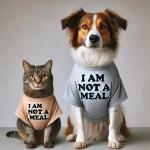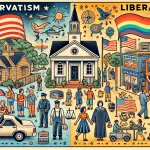One thing about being evangelical was that you didn’t believe in any of those sacred objects or rituals that Catholics did. Evangelicalism was all about faith. Sort of. See, just because we didn’t believe in actual sacred objects or rituals didn’t mean we didn’t actually have objects or rituals. Have you ever been in a Christian bookstore? Have you ever worn a WWJD bracelet? Have you ever listened to Christian contemporary music? Have you ever played the Bible edition of Apples to Apples? Yeah…
I’ve done a fair bit of reading about evangelicalism, and one thing I’ve found very interesting is the problem of definitions. One scholar has defined evangelicals by their beliefs: biblicism, crucicentrism, conversion, and activism. Another defined evangelicals as “anyone who likes Billy Graham.” A third said something I found extremely interesting: evangelicals are those who know where to find a Jesus poster and who show their children Veggie Tales. In other words, she defined evangelicals by their religious culture rather than by their religious beliefs. Fascinating.
So this got me thinking. Because, she’s right.
First, Veggie Tales. So much Veggie Tales. I remember splitting my sides I laughed so hard watching them – and the adults liked them too, because there were cultural references hidden all over them. But they filled a specific function: the kids found them entertaining, and the parents knew that the messages their children were receiving were “safe.” You can think of Veggie Tales as a sort of evangelical version of Sesame Street.
And then there were the Bibleman superhero adventures, and those movies featuring three teens/preteens who went back in time and tagged along on Bible adventures. I can’t remember the name of them at the moment, but there were a bunch and the animation was awful. And then of course there’s Focus on the Family Radio Theater and Adventures in Odyssey, which was primarily a radio show but also included movies.
 Next of course was clothing and accessories. There were T-shirts, oh so many Christian T-shirts! I’m not even going to get started on the T-shirts. There were so many. And then there are cross necklaces and earrings. Some people (though not us of course) got Christian tattoos. And of course, anyone who spent time as an evangelical in the 1990s knows of the WWJD bracelet fad. The idea was that wearing it was supposed to make you remember to ask “What Would Jesus
Next of course was clothing and accessories. There were T-shirts, oh so many Christian T-shirts! I’m not even going to get started on the T-shirts. There were so many. And then there are cross necklaces and earrings. Some people (though not us of course) got Christian tattoos. And of course, anyone who spent time as an evangelical in the 1990s knows of the WWJD bracelet fad. The idea was that wearing it was supposed to make you remember to ask “What Would Jesus  Do?” and let that guide your decisions and actions.* These bracelets were so ubiquitous that I doubt any evangelical child made it through that decade without owning one. I once had a professor who continually emphasized how adaptive evangelicals were, so I guess this proves that evangelicals have adapted to the fad. Because fad it was, and a big one at that!
Do?” and let that guide your decisions and actions.* These bracelets were so ubiquitous that I doubt any evangelical child made it through that decade without owning one. I once had a professor who continually emphasized how adaptive evangelicals were, so I guess this proves that evangelicals have adapted to the fad. Because fad it was, and a big one at that!
 And then there are evangelical board games and card games, such as Keys to the Kingdom, the Bible version of Apples to Apples, and Bible trivia games. Bible trivia games were awesome, mostly because I was so darn good at them (and with all the time spent at AWANA and the daily Bible time and Bible studies, combined with my competitive nature, it was no wonder!). Keys to the Kingdom was a pretty hilarious board game, and led to demands such as “quick, someone give me a faith card before I get stuck in hell!” or “darn it, I backslid into the world, someone hurry up and save me again!” From the rulebook:
And then there are evangelical board games and card games, such as Keys to the Kingdom, the Bible version of Apples to Apples, and Bible trivia games. Bible trivia games were awesome, mostly because I was so darn good at them (and with all the time spent at AWANA and the daily Bible time and Bible studies, combined with my competitive nature, it was no wonder!). Keys to the Kingdom was a pretty hilarious board game, and led to demands such as “quick, someone give me a faith card before I get stuck in hell!” or “darn it, I backslid into the world, someone hurry up and save me again!” From the rulebook:
OBJECT OF THE GAME
(1) To become “born again”
(2) Through the Holy Spirit draw closer to God
(3) To love your neighbor as yourself
(4) To put off the deeds of the flesh and walk according to the Spirit
Also, I actually highly recommend playing the Bible edition of Apples to Apples, but not by itself – that’s actually really boring, really boring. Instead, mix the cards with a regular edition of the game and play it like that. Trust me, having to consider cards like “Goliath” and “Madonna” against each other is worth it. The combinations and possibilities are hilarious.
Evangelicalism isn’t just a system of beliefs. It’s a subculture striving to be a counterculture. It has its own music, its own movies, its own board games and identifying clothing. Some of offers a great sense of belonging and purpose (WWJD bracelets for instance), some of it does what it’s designed to do fairly well (Christian contemporary music, for instance), and some of it falls on its face (Keys to the Kingdom was good for a laugh more than anything else). But it was a subculture I belonged to, the subculture of my childhood, and there will always be something bittersweet about remembering all that. And really? I think that last scholar has a point.
What are your experiences regarding this sort of evangelical culture?
—
*Somehow an entire generation of evangelical parents missed the fact that their children were wearing bracelets representing an idea that originated with nineteenth century Christian socialist. But I guess that didn’t matter, since their children were clueless about this too.













